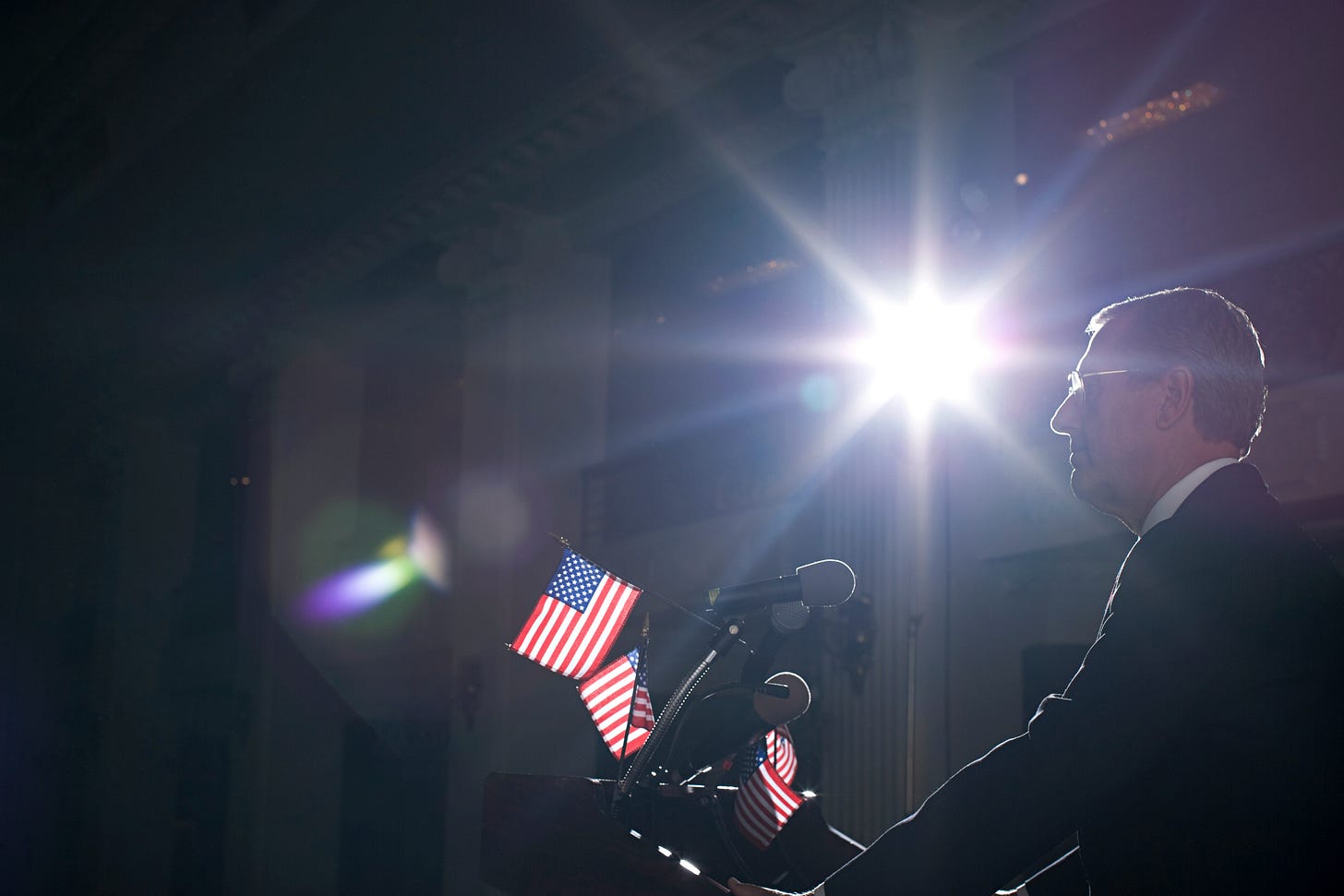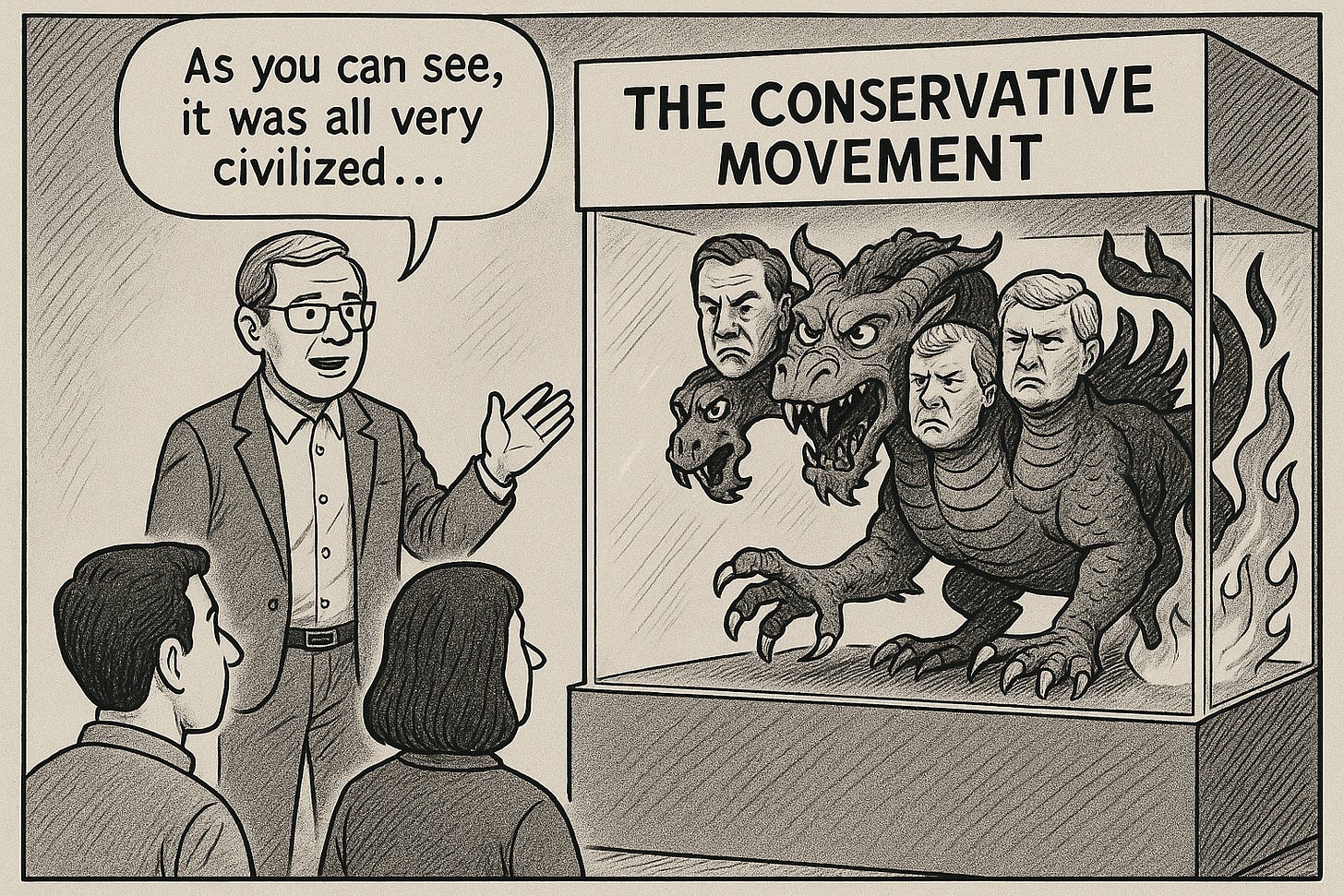Respectable, Reasonable, and Still in Denial
The political center didn’t lose control of the Right. It helped build the machine and now it can’t admit it.

For years, I studied American conservatism in academic settings, which required reading the thinkers, the strategists, and the mythmakers. What I found wasn’t just ideology or backlash. It was a carefully constructed system of racial and economic containment, dressed in the language of liberty and small government.
What surprises me now isn’t that Trump rose from this soil. It’s that so many of the so-called moderates, like historians, pundits, and podcasting speechwriters, still insist it all used to be reasonable.
How We Got Here
I have been writing a lot about the political center that brought us to this current moment. It may come from my study of the conservative movement throughout college and graduate school. I have consistently viewed the movement as a reaction to racial progress being made in the mid-to-late 20th century.
How could it not be?
Since the founding of America, race has been a central conflict within American political life, as the definition of who belongs and who doesn’t evolves. Still, the prevailing systems consistently leave out most people who trace their heritage to the Global South.
The color line in America has been the simplest and most effective way of organizing a nation shaped by gang, carceral, and wage labor, thus constructing fictional hierarchies to allow for elaborate, yet often blatant, wealth transfers. This is evident in the conservative movement, despite the pageantry and historiography that surrounds it. It’s straightforward: conservatism is part of the extended history of American racial coercion, which facilitated the transfer of wealth away from the historically significant multiracial middle class of the mid-20th century.
The Storytellers of Respectability
This crystallizes my belief that the only way forward for America is to reject the consensus that yesterday’s storytellers (many of them now respectable columnists or podcasters) continue to launder as noble. To explore this, I examine three essays.
The first is Alan Brinkley’s 1994 piece “The Problem of American Conservatism,” written before the Gingrich Revolution, which argues that conservatism had been underrepresented in scholarly discourse. Brinkley criticizes historians for focusing too narrowly on progressive traditions, missing the ideological diversity and depth within conservatism. Yet the essay doesn’t age well. It largely ignores how race functioned as the glue that held the conservative movement together, and how “small government” rhetoric often masked a more profound desire to maintain local hierarchies of race and class. Rather than confronting how the state had long served to reinforce racial domination and suppress labor, Brinkley offers a narrative that romanticizes conservatism’s philosophical roots without reckoning with its real-world consequences.
When Historical Recovery Becomes Sanitization
Julian Zelizer’s 2010 revisit of Brinkley reflects how quickly the intellectual rehabilitation of conservatism became mainstream. He documents the shift in historiography that treated the conservative coalition as a legitimate political tradition, rather than an ad hoc reaction to civil rights progress. This scholarly shift aligned neatly with a broader political desire to frame conservatism as a necessary counterweight to liberalism, an equal and opposite force, not a reactive one. Zelizer rightly notes the growing body of research on grassroots conservatism, the role of suburban moral entrepreneurs, and the political showmanship of figures like Reagan. But again, race is relegated to a supporting role in the analysis, as if Southern Strategy politics just happened to occur in the same years that federal troops left Black communities vulnerable again.
He discusses grassroots mobilization, anticommunism, and policy divides, yet treats racial backlash as one factor among many, rather than the engine. In doing so, he echoes the political center’s tendency to explain away racial grievance as policy disagreement. The Obama era exposed this blindness: as the first Black president ascended, cries of “socialism” and birtherism were covered by centrist commentators and Never Trump conservatives as excessive partisanship, not racial panic.
In hindsight, the fact that a multicultural coalition elected Barack Obama was treated as a satisfying endpoint rather than a fragile opening shows how under-theorized American racial politics remain in the minds of centrists.
The Riot Was a Revelation
This refusal to center race culminated in the events of January 6th, when Confederate flags, a symbol of racialized slavery and rebellion, entered the Capitol. This wasn’t simply a riot. It was a historically resonant act of White counterinsurgency. Jennifer Whitmer Taylor’s chapter in Rebirth draws this line clearly, comparing the insurrection to Reconstruction-era violence. She argues that the United States has never fully confronted the legacy of White paramilitary resistance to multiracial democracy. Drawing from Kathleen Belew’s scholarship on White power movements, Taylor outlines how racialized militancy never disappeared, it simply rebranded through militia networks, coded language, and constitutional cosplay.
Her analysis makes visible what many in the political center struggle to say plainly: that the racial violence of Trumpism is not a break from American conservatism, but one of its logical outcomes. It’s not the snake in the garden, but the soil.
Who Built the House Trump Walked Into?
Figures like David Brooks, the Pod Save America hosts, and writers at The Bulwark have offered compelling diagnoses of our democratic crisis, but often without a complete reckoning. Brooks mourns the collapse of discourse but spent decades endorsing the moral language of neoliberal austerity. He now wants a new civic center, as if civic decay is something that just... happened, rather than something carefully constructed through bipartisan market worship and racial compromise. The Pod Save cohort treats democracy as a branding opportunity, reducing structural critiques to vibe shifts and merch drops.
The Bulwark, perhaps most illustrative, often positions itself as the principled alternative to Trumpism. And that project has real value: they have consistently rejected authoritarianism, platformed cross-ideological conversations, and spoken plainly about the Right’s moral collapse. But too often, the story stops there. There is little sustained engagement with how racial grievance, voter suppression, and economic orthodoxy shaped both the conservative establishment and the populist fury that followed.
Their house was haunted long before Trump moved in.
Nostalgia Is Not a Strategy
To be clear, I do not doubt the sincerity of many in the center. But sincerity without self-reflection is not innocence. Historians like Brinkley, commentators like Brooks, and the many former Obama-era podcasters have all contributed to a sanitized vision of the American center. Their failure to fully confront the racial and economic violence embedded in the systems they defend leaves us unprepared for the crises we face now. Their storytelling, often earnest and well-intentioned, still relies on an older narrative template: American democracy is messy but self-correcting. But what if it isn’t?
We live in a moment when the very idea of multiracial democracy is being called into question, not just by open reactionaries, but by the political center's quiet refusal to name the stakes. Trumpism may have exposed the rot, but it did not invent it. In some ways, Trump said the quiet parts aloud, expressing openly the hierarchies that had long been safeguarded by euphemism. The real threat is not flamboyant cruelty, but the bureaucratized, credentialed, and plausible-sounding maintenance of a racial and economic order in decline.
It is not enough to reject incivility or excess.
We must reject denial.
Democracy is work, and historiography is often its most significant obstacle. It’s time to stop listening to the voices that seek to restore a fantasy and start building something tangible, with new narrators, new frameworks, and a lot less nostalgia.






Your critique of the Bulwark is spot on. I've tried to engage them on the very issues you name, and crickets.
The think with racism is that exists everywhere, even among blacks in Africa (the Tutsi vs the Hutu for example).
Racism, like homophobia, transphobia xenophobia, etc. are a tool by which to keep the population divided against itself, to ensure the preeminence, safety and security of the ruling class
They are subsets of the class war, which the ruling class has apparently won.
That which is the ruling class was originally defined by heredity.
Royalty and nobility were descendants of those who invaded and conquered the land, in other words the descendants of bloody and murderous thiefs, this is nobility, this is royalty.
Social and technological advances, as well as a revolution or two, did not eliminate class distinctions, just changed the way they were organized and defined, with the industrial revolution you had the rise of new money, the Gilded Age, but that reverted to heredity, as the upper class, found legal devices, like trusts, in which they could pass on their bloodied wealth to their heirs, as technology advanced. Newly minted millionaires joined the upper class,media moguls then technocrats and again the position at the top of the social pyramid passed on to their heirs.
Thus we have Lachlan Murdoch, continuing the line and policy of his father Rupert, David Ellison continuing his father Larry.
We are ruled by dynasties, some seen, some unseen, some famous, some obscure,The Bush's, the Clinton's, the Murdoch's, the Ellison's, the Newhouse, the Redstone dynasty.
The ruling dynasties we don't see are those that have representatives on the board of directors of multinational corporations. Some corporations are family owned or controlled.
We'are donkey's bridled to a mill stone in a grist mill., and distracted by a media which they own and/or control.
These factions which disturb us and set us against each other, don't arise out of thin air, they are created and perpetuated. Problems don't exist, until we are told their is a problem.
Look at children in a kindergarten class, they sit and play nicely together, and the problem arises when one or more claim exclusive rights to an object. It is only when they get older, and their mind and attitudes are warped by those that are older, be they other children, or their parents or teachers that class hierarchies are formed, that factions are formed, that their are in groups and out groups (scapegoats). And the system perpetuates the problem, with King and Queen of the Prom, year books voting the most popular or most likely to succeed.
Being "born on the wrong side of the tracks" limits your economic and social growth. The subject is the stuff of movies and books, the Great Gatsby, The wolf of Wall Street, the Great Importer
And the poor dude or dudette, who manages to find his or her way through will and effort, is almost always portrayed as a rogue
Speaking as a straight white credentialed male, it has dawned on me—too slowly—that the society Trumpism has revealed us to be is only revelatory to those of us blinded by privilege. Your line about Obama’s election being a fragile opening rather than a satisfying endpoint resonated. I think many people like me who assumed the relative ease of our lives reflected an “end of history” liberal consensus are grappling with the realization that not only was that theory of the case entirely wrong—it was after all the result of unacknowledged privilege—but also that our democratic experiment is _not_ self-correcting. Indeed the heartbreaking realization I have come to during these past several months, witnessing the overt and tacit acceptance of domination, as well as educating myself more deeply about the history of our country, is that we have always been a conflicted, deeply fractured society. The moments of progress are the aberrations in the storyline, not its arc.
It is bizarre to admit that despite being neither conservative nor religious, the touchstones I increasingly find myself drawn to as lights in the darkness are Lincoln and Christ. Both understood the fundamental truth that without the capacity for grace we are well and truly lost. Unfortunately for us hatred is much more easily monetized than grace.